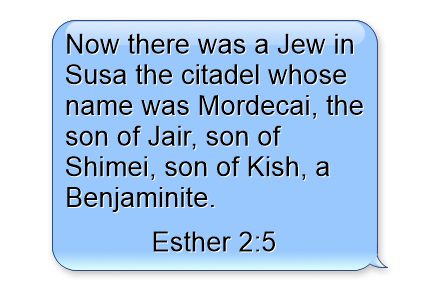Who was the Mordecai in the Old Testament? Why is it important for us to know about him?
Mordecai the Jew
The first thing we learn of Mordecai was that he was a Jew which Esther 2:5-6 says “Now there was a Jew in Susa the citadel whose name was Mordecai, the son of Jair, son of Shimei, son of Kish, a Benjaminite, who had been carried away from Jerusalem among the captives carried away with Jeconiah king of Judah, whom Nebuchadnezzar king of Babylon had carried away.” Esther became connected with Mordecai because “when her father and her mother died, Mordecai took her as his own daughter” (Esther 2:7b) so this made Esther and Mordecai very close but something interesting came up; Mordecai didn’t want Esther to reveal to anyone that she was actually a Jew which is why “Esther had not made known her people or kindred, for Mordecai had commanded her not to make it known” (Esther 2:10).
A Plot Discovered
God had sovereignly placed Mordecai in the right place at the exact right time where “Mordecai was sitting at the king’s gate, Bigthan and Teresh, two of the king’s eunuchs, who guarded the threshold, became angry and sought to lay hands on King Ahasuerus” (Esther 2:21) “And this came to the knowledge of Mordecai, and he told it to Queen Esther, and Esther told the king in the name of Mordecai” (Esther 2:22) so Mordecai saved King Ahasuerus’ life. This matter would be very important later in the Book of Esther.
Haman’s Plot to Exterminate the Jews
Haman, the king’s aide, was one of the vainest men in the Bible “And all the king’s servants who were at the king’s gate bowed down and paid homage to Haman, for the king had so commanded concerning him. But Mordecai did not bow down or pay homage” (Esther 3:2) “Then the king’s servants who were at the king’s gate said to Mordecai, “Why do you transgress the king’s command” (Esther 3:3)? Mordecai had good reason “And when they spoke to him day after day and he would not listen to them, they told Haman, in order to see whether Mordecai’s words would stand, for he had told them that he was a Jew” (Esther 3:4) “And when Haman saw that Mordecai did not bow down or pay homage to him, Haman was filled with fury” (Esther 3:5). Mordecai was forbidden by Jewish law to bow down to any man other than a Jewish king Haman “disdained to lay hands on Mordecai alone. So, as they had made known to him the people of Mordecai, Haman sought to destroy all the Jews, the people of Mordecai, throughout the whole kingdom of Ahasuerus” (Esther 3:6).
Mordecai’s Appeal to Queen Esther
“Hathach went out to Mordecai” (Esther 4:6a) “and Mordecai told him all that had happened to him, and the exact sum of money that Haman had promised to pay into the king’s treasuries for the destruction of the Jews” (Esther 4:7) “Mordecai told them to reply to Esther, “Do not think to yourself that in the king’s palace you will escape any more than all the other Jews” (Esther 4:13). Esther called all the Jews to fast for her and she would approach the king and try to intervene on behalf of the Jews. In the meantime, they built gallows for Mordecai to hang on but on a “night the king could not sleep. And he gave orders to bring the book of memorable deeds, the chronicles, and they were read before the king” and there it was discovered “how Mordecai had told about Bigthana and Teresh, two of the king’s eunuchs, who guarded the threshold, and who had sought to lay hands on King Ahasuerus” (Esther 6:1-2). The king said “What honor or distinction has been bestowed on Mordecai for this?” The king’s young men who attended him said, “Nothing has been done for him” (Esther 6:3).
Haman’s Plan Backfires
Just when the king had learned of Mordecai’s discovering the plot to take the kings life “Haman had just entered the outer court of the king’s palace to speak to the king about having Mordecai hanged on the gallows that he had prepared for him” (Esther 6:4) and told Haman to “take the robes and the horse, as you have said, and do so to Mordecai the Jew, who sits at the king’s gate” (Esther 6:10) and in a strange twist of fate “the gallows that Haman has prepared for Mordecai, whose word saved the king, is standing at Haman’s house, fifty cubits high” (Esther 7:9) “And the king said, “Hang him on that.” So they hanged Haman on the gallows that he had prepared for Mordecai. Then the wrath of the king abated” (Esther 7:10),
Conclusion
The loyalty of a Jew named Mordecai who informed the king of a plot to take his life ended up saving his own life and those of the Jews, showing that honesty, even before a pagan king, is rewarded by the God Who is sovereign over all the kings of all the kingdoms of the earth.
Article by Jack Wellman
Jack Wellman is Pastor of the Mulvane Brethren church in Mulvane Kansas. Jack is also the Senior Writer at What Christians Want To Know whose mission is to equip, encourage, and energize Christians and to address questions about the believer’s daily walk with God and the Bible. You can follow Jack on Google Plus or check out his book Blind Chance or Intelligent Design available on Amazon.












